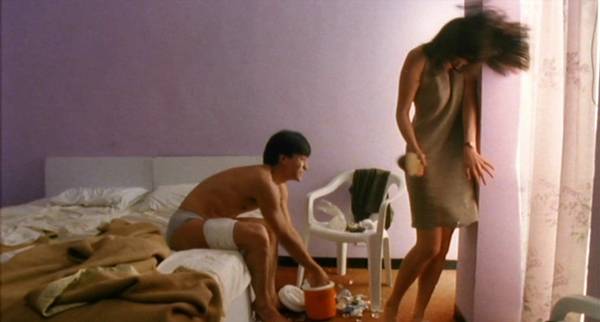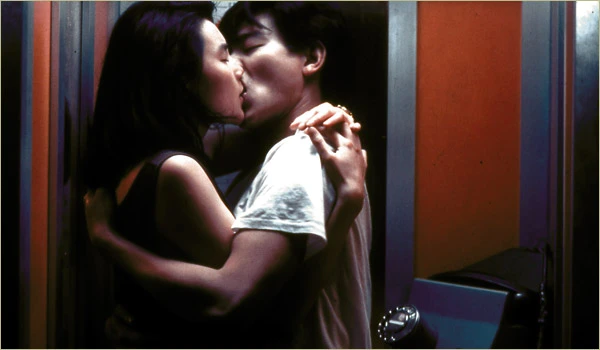As Tears Go By (1988). ANDY LAU AND MAGGIE CHEUNG IN AS TEARS BO BYLike romance with your gang beatings?
ANDY LAU AND MAGGIE CHEUNG IN AS TEARS BO BYLike romance with your gang beatings?This was my first Wong Kar-wai-directed movie, as well as his. But he was a virtually unknown quantity at first in this country and I didn't see it till six years after its Hong Kong release. I saw it as a solitary explorer, in a cinema on the edge of San Francisco's Chinatown, tipped off by an obscure newspaper article, in the mid-nineties, in a double feature, followed by
Ashes of Time. It was a memorable afternoon, a milestone in my life as a cinephile that hooked me and left me pleasantly befuddled. This was the start of what became my most exciting movie discovery of the decade.
Tears is where Wong started to be Wong - but not quite. Nathan Lee, once a stylish and bold young free lance movie critic, briefly in charge of movie reviews at the
Voice, now seems restricted to austere venues like
Film Comment, wrote about the film in 2008 in the
New York Times, ten years after it came out in Hong Kong, when it finally got an official US release (see also J. Hoberman's
Village Voice piece of the same date). This will show what people think of it now. To me it was a baffling but intriguing combination of gangster violence and romance. The second on the bill, Wong's dreamlike riff on the martial arts film
Ashes of Time (1994 - out the same year as
Chungking Express) was more beautiful and even more totally baffling. I didn't know what I had seen that day but I knew I would want more.
In his later
assessment Lee not surprisingly waxes quietly rhapsodic. I've always felt it makes no sense for a cinephile to be any other way about this filmmaker. Lee describes
As Tears Go By as "convulsing" "to the rhythm of mah-johngg parlor brawls" and "back-alley beat downs" and "semiautomatic flares" in "the neon lights."
But he notes that it's the "rapt little interludes" that really count, like "an aspirin tablet dissolving in a bottle of water" or "a woman lingering in the fluorescent shadows of a ferry terminal," even a "modest tracking shot" of drinking glasses ranged on a kitchen shelf.
As Tears Go By is a unique new mix of Hong Kong gangster movie genre with subtle romance in a liberated, uniquely poetic new style. You've got this muted love story between Andy Lau and a baby-faced Maggie Cheung, with that passionate kiss in the phone booth. He's a small-time triad debt enforcer and she's a quiet country cousin he's not previously met who shows up and sleeps on the couch of his Hong Kong apartment while in town for medical tests. The early moments when she arrives are quiet, awkward, and real. They make an impression (and may be more deeply ingrained for me, since they were the first scenes of a Wong Kar-wai movie I ever saw). But then comes the gangster stuff that Ngor (Cheung) never directly witnesses, though she does see Wah (Lau) all bloodied and starts to guess what he may be up to.
There's all this stuff about Wah's kid brother Fly (Jacky Cheung), a would-be gangster who lacks the cool. He's a hothead, and also has recurrent bad luck that will have terrible consequences. With his overacting and googly eyes, Jacky Cheung makes the gangster scenes seem like caricatures and they jar with the quiet authenticity of the romantic moments.
Wong interweaves crime and romance more successfully in
Fallen Angels and
Chungking Express, and he develops the female characters and the romances better in
Days of Being Wild, which also interweaves crime and sensuality in a dreamy and unique way, making
Days his first masterpiece and turning Leslie Cheung into an unforgettable star. Watching these six movies in the Roxie retrospective together allows you to enjoy how the same group of young stars got to keep coming back, Wong's own special company of players.
As Nathan Lee put it, in
As Tears Go By a lot of the Wong's style and preoccupations were clearly already there, but not in wholly integrated fashion. He hadn't yet fully reconciled his "genre tropes" with his "digressive, deeply intuitive impulses." Nonetheless if you watch this film carefully you'll see it's already unlike the work of any other filmmaker.
Watching the 1988
Tears along with the original 1994
Ashes of Time that afternoon on the edge of San Francisco's Chinatown, I naturally saw this was a director who was twisting Chinese cinematic genres in a deeply unique style. Could the gangster romance and the wuxia dream be from the same hand? Yes, they definitely could be, but it would take time to digest. You learn how he uses what Peter Brunette calls in a
Hollywood Reporter review Wong's "signature step-printing technique,* his off-kilter shooting angles and a flamboyant visual style that often produces something more like an abstract expressionist painting than a movie" - all of this more richly and confidently emerged right after
Tears, in Wong's second feature,
Days of Being Wild, when the director began his remarkable collaboration with the cinematographer Christopher Doyle.
Nathan Lee points out a trademark incident in
Tears. Ngor sends Wah a note that's the first sign that she can't get him out of her head, even back home, and reveals that, knowing he tends to break the glasses in his kitchen and will break them all eventually, she has gotten a new one and hidden it somewhere so, when he runs out, he can contact her and she'll tell him where it's hidden. This as Lee says isn't unlike how Faye Wong, the "impish gamine" in
Chungking Express, shows the crush she has on a handsome policeman (Tony Leung Chiu-Wai) by sneaking into his apartment when he's not there and straightening it up; or the way a "heartbroken journalist" in
In the Mood for Love whispers a secret into a crack at Angkor Wat. And somehow it's of a kind with all that talk by Takeshi Kaneshiro in
Chungking Express about expiry dates of canned pineapple, or Leslie Cheung's come-on line about there being love between him and Maggie Cheung for a minute when he's flirting with her in front of the soft drink stand at the outset of
Days of Being Wild. These are all quirky inventions, partly inspired by Chinese pop romance novels, that embody the style and make way for Wong's "rapt little interludes," as Lee puts it, "that arrest attention."
As Tears Go By ramps up gangster tragedy, but it's the doomed romance with the cousin that holds it all together, even then.
Lee ends his piece with a lovely understated homage. He points out that Maggie Cheung in
As Tears Go By is affecting in an "underimagined" role. But when she reappears in Wong's next film,
Days of Being Wild, her director "had mastered his feel for the eloquence of uninflected faces caught just so in the light. And everything else."
Everything else indeed.
__________________
*See Mike D'Angelo's analysis in
The Dissolve of a moment in
Chungking Express, "How Wong Kar-Wai turned 22 seconds into an eternity."
As Tears Go By 旺角卡門 (Wong Gok ka moon, "Mong Kok Carmen"). 99 mins., debuted in the 1988 Cannes Directors Fortnight. It was Wong's directorial debut; he had been a writer on fifteen films before that, 1982-88. Jacky Cheung won the best supporting actor award and William Chang best art direction at the Hong Kong film awards.
 MAGGIE CHEUNG, ANDY LAU IN AS TEARS BO BY
MAGGIE CHEUNG, ANDY LAU IN AS TEARS BO BY





